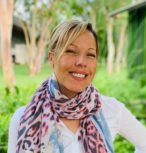DNA reveals the past and future of coral reefs
New DNA techniques are being used to understand how coral reacted to the end of the last ice age in order to better predict how they will cope with current changes to the climate. James Cook Univer

From 2005 to 2022, the main node of the ARC Centre of Excellence for Coral Reef Studies was headquartered at James Cook University in Townsville, Queensland (Australia)








Abstract: Complex interdependencies between social and ecological dynamics underpin many important environmental problems. To account for these complex dynamics, over the past several years my colleagues and I have been developing an interdisciplinary network modelling framework that captures relationships within and between people and nature. This approach leverages cutting edge methodological advances in the network sciences and brings together perspectives from across the natural and social sciences to identify important structural relationships between people and nature that may facilitate or constrain outcomes in social-ecological systems. In this talk, I review the theoretical foundations of this approach and demonstrate its utility in uncovering novel insights at multiple scales through concrete empirical examples. Drawing on population-level data from a Papua New Guinean island, I first demonstrate how complex patterns of social-ecological interdependencies can help to explain adaptive and transformative action in response to climate change impacts by supporting learning, social contagion, and the internalization of social-ecological feedbacks. Next, I present comparative evidence from Kenya that the alignment of social and ecological structures in coral reef fishing communities can lay the foundation for improved coral reef ecosystem conditions by supporting mechanisms that underpin cooperation. This body of work provides important empirical insight demonstrating how social action and resulting social and environmental conditions can be facilitated and/or constrained by complex patterns of relationships that extend across the social-ecological divide.
New DNA techniques are being used to understand how coral reacted to the end of the last ice age in order to better predict how they will cope with current changes to the climate. James Cook Univer
A new study on the effects of climate change in five tropical countries has found fisheries are in more trouble than agriculture, and poor people are in the most danger. Distinguished Profess
James Cook University researchers have found brightly coloured fish are becoming increasingly rare as coral declines, with the phenomenon likely to get worse in the future. Christopher Hemingson, a
Researchers working with stakeholders in the Great Barrier Reef region have come up with ideas on how groups responsible for looking after the reef can operate more effectively when the next bleaching
Abstract: As marine species adapt to climate change, their heat tolerance will likely be under strong selection. Individual variation in heat tolerance and its heritability underpin the potential fo
Abstract: The Reef Ecology Lab in KAUST’s Red Sea Research Center explores many aspects of movement ecology of marine organisms, ranging from adult migrations to intergenerational larval dispersal
Abstract: Macroalgal meadows are a prominent, yet often maligned component of the tropical seascape. Our work at Ningaloo reef in WA demonstrate that canopy forming macroalgae provide habitat for ad
Abstract: Sharks are generally perceived as strong and fearsome animals. With fossils dating back at least 420 million years, sharks are not only majestic top predators but they also outlived dinosa
Abstract: Connectivity plays a vital role in many ecosystems through its effects on fundamental ecological and evolutionary processes. Its consequences for populations and metapopulations have been
Abstract: Evolution of many eukaryotic organisms is affected by interactions with microbes. Microbial symbioses can ultimately reflect host’s diet, habitat range, and even body shape. However, how
Abstract: The past few years have seen unprecedented coral bleaching and mortality on the Great Barrier Reef (GBR) but the consequences of this on biodiversity are not yet known. This talk will expl